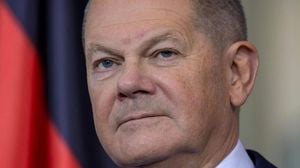Japan's diplomatic efforts are ramping up as tensions escalate over North Korea's military alliance with Russia. On November 16, 2024, Japanese Foreign Minister Takeshi Iwaya arrived in Kyiv, Ukraine, to address the growing security concerns posed by the deployment of North Korean troops to support Russia's military actions. This visit emphasizes Japan's increasing focus on regional security and its support for Ukraine amid the continuing conflict.
The primary objective of Iwaya's visit was to meet with his Ukrainian counterpart, Andrii Sybiha, to reaffirm Japan's unwavering support for Ukraine, which has been embroiled in a war against Russia for several years. During their discussions, Iwaya and Sybiha addressed potential additional sanctions against Moscow, reflecting Japan's commitment to take decisive action against nations infringing on international peace.
Significantly, the Japanese Foreign Ministry highlighted Japan's "grave concern" over the burgeoning military cooperation between North Korea and Russia. According to intelligence reports from the United States, South Korea, and Ukraine, up to 12,000 North Korean soldiers have reportedly been dispatched to Russia under the framework of a defense treaty aimed at mutual assistance. This alarming trend, characterized by North Korean troops actively participating alongside Russian forces, has raised eyebrows across the globe.
Just last week, Ukrainian officials reported instances of small-scale skirmishes taking place between Ukrainian forces and North Korean troops, with artillery fired on North Korean positions located near Russia’s Kursk border region. This indicates not just military cooperation but also the deepening entwining of their military strategies, sparking fears about the broader ramifications for regional stability.
Sybiha expressed serious apprehension about North Korea’s role, indicating Ukraine's intelligence services suspect Pyongyang is aiding Russia's military endeavor to secure access to Russian military technology, including missiles and nuclear capabilities. This is particularly distressing, as Sybiha described the collaboration between Russia, North Korea, and Iran as posing “a direct threat not only to Europe but also to Southeast Asia and the Middle East.”
During the meeting, the two foreign ministers also focused on Japan’s potential involvement with Ukraine’s plans for recovery and peace following the conflict. They discussed the implementation of what Sybiha called Ukraine’s "victory plan and peace formula," aimed at establishing stability after years of war. The commitment from Japan resonates with the broader international backing for Ukraine to restore its sovereignty.
This heightened emphasis on military collaboration is occurring against the backdrop of increasingly diplomatic discussions involving Ukraine’s President Volodymyr Zelenskyy. He has stated his intention to utilize diplomatic means to conclude the war next year, drawing attention to the potential for renewed negotiations.
The dynamics of international relations are ever-changing, especially following recent events, including the victory of Donald Trump in the U.S. presidential elections on November 5. This development has prompted fresh thoughts on negotiation strategies from various leaders, including Zelenskyy, who underscored the importance of vigilance, cautioning against Russia's willingness to engage; he labeled such interactions as mere public relations maneuvers without genuine intention to pursue peace.
Japan’s visit to Ukraine, amid these turbulent times, signifies more than just diplomatic footwork; it echoes the sentiments of global leaders expressing anxiety over North Korea's actions and its ties to Russia. While talks are underway, including phone calls between Russian President Vladimir Putin and German Chancellor Olaf Scholz—marking their first direct communication in nearly two years—the apprehension remains palpable. Various stakeholders are stressing the imperative of systematic support for Ukraine to disrupt the current momentum of Russian advancements.
Heightened fears of aggression are compounded by increasing drone and artillery attacks from Russia, which continues to target Ukrainian cities, including Kyiv, contributing to the urgency of international responses and solidarity with Ukraine. A recent wave of drone attacks on Kyiv caused significant damage to infrastructure, underscoring the uninterrupted threat posed by Russia.
Overall, Japan's proactive approach highlights its recognition of the intersecting threats originating from Russian and North Korean military alliances. The emergence of strains on regional stability and the risks posed to international peace and security requires careful navigation and strong collaboration among allies. Japan's actions reflect not just bilateral support for Ukraine but also its commitment to reinforcing broader security frameworks across the region.



